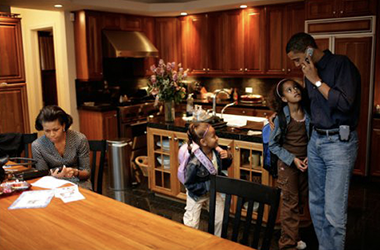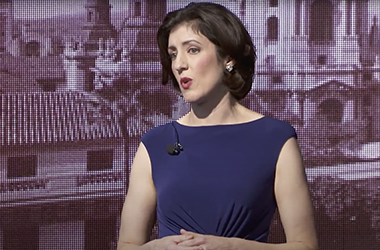What the Obamas Can Reveal About Marriage With Children Today

 The New York Times magazine last Sunday ran an article “The Obamas’ Marriage, ” At one point, Michelle Obama says, “This was sort of an eye-opener to me, that marriage is hard. But going into it, no one ever tells you that. They just tell you, ‘Do you love him?’ ‘What’s the dress look like?'”
The New York Times magazine last Sunday ran an article “The Obamas’ Marriage, ” At one point, Michelle Obama says, “This was sort of an eye-opener to me, that marriage is hard. But going into it, no one ever tells you that. They just tell you, ‘Do you love him?’ ‘What’s the dress look like?'”
In openly talking about how marriage today, especially marriage with children, is hard work, the Obamas are blowing the lid off a big secret. At least one of two marriages goes into decline when the first child arrives. When children arrive, contemporary couples are forced into renegotiating a new contract, without knowing ahead of time they would have to, and with no existing framework or role models for how to go about doing it.
My husband and I were married fifteen years ago. We wrote our own vows, promising to be true to each other and the dreams and goals we both share. We had been married for nearly seven years when I got pregnant. I remember the months of my pregnancy nostalgically as an idyllic time in our marriage. Every night David would pull out his guitar and sing. Our friends threw baby showers for us celebrating what was clearly perceived as an event that would enrich our marriage now that we would be a true “family.”
Then somehow we went from basking in the glow to shouting in the kitchen.
Several months after our daughter was born I heard myself shouting at him, “If you can’t figure out a way to fix this mess and spend more time with us and less time at work, I’m leaving for my parents’ house in Minnesota and I’m not coming back until you do!” The shock to our relationship was sudden and frightening. And a secret, we figured it was only us. Except eventually I realized it wasn’t, because as I talked to mothers everywhere in writing my book, This is Not How I Thought It Would Be: Remodeling Motherhood To Get the Lives We Want Today, it turned out most couples were experiencing some version of that shock. And that years of research said this marital upheaval is common for couples today.
Barack and Michelle Obama are playing out in public an extreme version of the challenges shared by many mothers and fathers today. So many of us are trying to figure out how to remodel a contemporary marriage in the face of a host of more traditional barriers and expectations: jobs with long hours, travel, and requirements to relocate; how to make two jobs fit into lives that suddenly also need to fit in enough hours to care for and enjoy our children; stereotypes that mothers are better with children and fathers are clueless; finding desperately needed time as a couple to be a couple and stay connected.
What we want from our marriages is totally different today that it used to be – today both men and women prioritize finding a partner for life over children as a reason to be married, both expect to have jobs, both expect to be involved with family life. Yet our workplaces, public policies, and cultural expectations are still rooted in the 1930’s and 1940’s. When we have children, all this outdated nonsense comes crashing down on our marriages, sending us down a one-way street to a 1950’s cul de sac.
My husband and I tackled this challenge head on, remodeling motherhood, fatherhood and marriage along the way to fit the lives we wanted to lead. Not easy by any stretch, but rewarding. Then a year and a half ago, we renewed our wedding vows, and added a few, to acknowledge and celebrate that our marriage was something new and different now that we had a child.
The last line of the article is Michele Obama again, sharing perhaps the most profound and hopeful point in the article. The equality of any partnership, she explains, “is measured over the scope of the marriage. It’s not just four years or eight years or two. We’re going to be married for a very long time.” And along the way that partnership needs to be renegotiated and remodeled at key points, some predictable – like having children – and some unpredictable – like getting elected President. Let’s hope that the Obamas’ willingness to speak so frankly about their marriage opens up needed conversations in kitchen tables across the country about how to remodel our partnerships and the way the world around us supports them too.
For more information I recommend:
- When Partners Become Parents by Carolyn Pape Cowan and Philip A. Cowan
- The Transition to Parenthood by Jay Belsky and John Kelly
- Equally Shared Parenting, forthcoming by Marc and Amy Vachon at www.equallysharedparenting.com
-
The Third Path Institute at www.thirdpath.org


